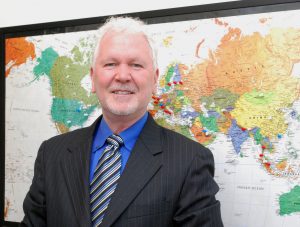For DePaul Finance Professor Rebel Cole, it’s not unusual to spend one week helping the Banque du Liban in Beirut stabilize the Lebanese financial system and the next week teaching a finance class on another continent. Throughout his career, Cole has blended practice and theory to develop a unique skill set that allows him to combine his love for finance and economics with his passion for teaching and research.
“I take what I’ve learned from my experience working in the government and with banks and translate it into lessons that will help students prepare for their finance careers,” says Cole. “I want my students to know what to expect when they get in the real world.”
A native of rural North Carolina, Cole brings a wealth of international finance experience into the classroom, having worked for the Federal Reserve Board, the World Bank and the International Monetary Fund. He has traveled the world—from Europe to Asia to the Middle East—to assist in the development of stress tests, financial stability indicators and off-site monitoring systems for commercial banks and other financial institutions. He’s also a prolific scholar whose papers have been cited by more than 5,000 researchers.
In his courses, Cole primarily uses real-world case studies that challenge students to take on the role of the decision-maker. He also talks with students about finance-related news stories, encouraging them to discuss how the issues relate to what they are learning and the current state of the economy. These discussions help students think critically, speak with confidence and understand how finance functions in the real world, he says.
“I want my students to know what to expect when they get in the real world.”
“I like to have an interactive classroom where we are discussing real-life examples instead of just having me lecture,” says Cole. “We can solve real problems and delve into what the decision-makers did right and wrong, so that we can learn to avoid making those mistakes in the future.
By Andrew Zamorski

